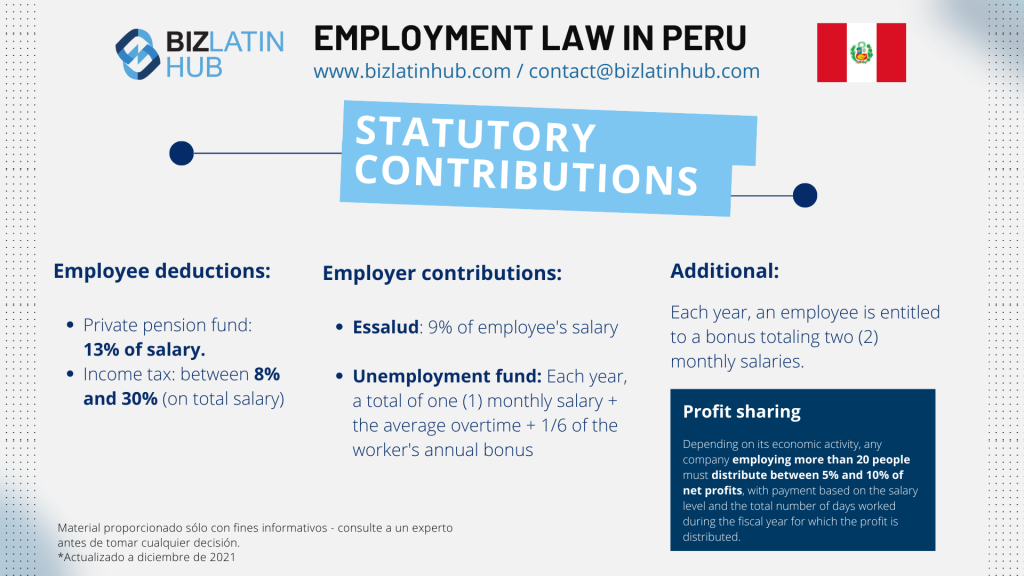As Peru recovers from the economic and social ravages caused by the COVID-19 pandemic, the country’s technology sector promises to play an important role in economic regeneration. Here, three tech companies in Peru that will emerge stronger from the pandemic are highlighted. Countries bounce back, and Peru is certainly doing just that.
If you are considering doing business in Peru, learning about companies in the country that will emerge stronger after the COVID-19 pandemic, might provide you with valuable ideas about your own commercial venture and how to ensure the success of your operations during these challenging times, whether that’s with tech companies in Peru or elsewhere.
Biz Latin Hub can help you work with tech companies in Peru, whether you’re considering entering the market directly or simply want to connect. Our array of back office services will keep you compliant and help you navigate the local legal landscape. Not only that, but thanks to our 18 dedicated local offices across Latin America and the Caribbean, we can help you do business across the region as well.
Why invest in Peru?
Peru’s economy experienced 18 consecutive years of growth above the average recorded in Latin America up to 2019. The sixth-largest market in the region by gross domestic product (GDP), the South American nation maintains a business- and investment-friendly environment, and has reached numerous free trade agreements (FTAs) with key markets such as Canada, Chile, the EU, Japan, Mexico, and the United States.
Furthermore, with a GDP (PPP) of $4.78 billion (all figures in USD), the Andean country received a foreign direct investment (FDI) inflows of $8.9 billion in 2019 and has a very low inflation rate of 1.3 percent, according to the 2020 Index of Economic Freedom. Peru’s most important export commodities include copper, gold, petroleum, machinery, vehicles, and paper.

The impact of the pandemic on Peruvian business
Peru was among the hardest-hit countries in Latin America by COVID-19. According to the National Institute of Statistics and Informatics – INEI, the country’s overall activity dropped 40 percent in April, compared to the same month in 2019 and the mining sector — which represents 60 percent of the country’s exports — was forced to cut production drastically during the same period.
The country’s GDP fell by 16.5 percent between January and July, due largely to restrictions imposed by the Peruvian government to prevent the spread of the virus. Meanwhile, the national unemployment rate increased by 8.8 percent between April and June, with approximately 6.7 million Peruvians losing their jobs during the period.
Among the sectors that have been most affected in the first semester are hospitality, housing, construction, and transportation. According to the INEI, the hotel industry experienced a 90 percent decrease in sales during the pandemic. Meanwhile, the construction sector saw employment fall by 67.7 percent between April and June, while the professional services sector saw a 58 percent contraction in sales, leading to over 860,000 job losses.

Peruvian Industries that saw growth during the pandemic
Despite the economic chaos, industries such as agriculture, telecommunications, and financial services were unaffected or even boosted during the pandemic. In the agricultural sector, the production, distribution, and sale of food remained stable during the quarantine, while the production of eggs, pork, and milk increased considerably.
The telecommunications sector grew 3.44 percent during the first half of 2020, due to the increase in internet and television subscriptions, stimulated by the preventive lockdowns. Moreover, according to INEI, the financial services and insurance sector grew 3.95 percent, owing to the increase in loans to large, medium, and small enterprises, which increased by 7.64 percent.
For its part, the Peruvian Chamber of Electronic Commerce (CAPECE) indicated that electronic commerce grew 240 percent during the pandemic and is expected to continue growing in the future.
3 tech companies in Peru that will emerge stronger from the pandemic
Crehana
Crehana is an education technology (EdTech) platform for online courses that emerged to exceed 3.5 million users in Latin America during the pandemic. The company revealed that during the toughest months of the pandemic it experienced a 48 percent increase in browsing time with tablets, an 8 percent increase in browsing with desktop computers, and a 36 percent increase in mobile phone traffic.
With more than 500 virtual courses available, Crehana continues to grow through alliances with different organizations in Peru, including a deal struck with the University of Engineering and Technology (UTEC) to offer even more courses on different topics.
Kambista
Kambista is Peru’s first digital currency exchange website that allows people to exchange Peruvian Soles and US Dollars in a simple, easy, and fast way. It enables users to do this through the website or through the mobile application from anywhere in the world.
The tech firm has won Startup Peru — part of the National Program of Innovation for Competitiveness and Productivity, which offers seed capital and support in scaling “innovative, dynamic and high-impact ventures.”
The platform has reported a tripling of users during the pandemic, with up to 1,000 new users joining per month in the early months of the pandemic and the platform reaching more than 300,000 successful transactions. According to Daniel Bonifaz, the CEO and co-founder of Kambista, those numbers mean the company expects to have grown 80 percent during the pandemic.
The company has seen unexpected developments in user profiles, with increasing activity among clients undertaking smaller-scale transactions, as well as older clientele than their target demographic, according to Bonifaz.
Netzun
Netzun is another EdTech platform that has seen a major uptick in traffic and usage during the pandemic, reporting a 750 percent increase in users in the first half of the year alone.
Netzun offers over 120 courses in diverse subject areas and grants its users a certificate upon completion of the course. In addition, it allows its users to share communication with other clients through a forum and includes additional opportunities to learn in their free time. Among the most popular courses during the pandemic were online marketing and Microsoft Office.
“We had an average 4.5 million minutes of Peruvians connected [to our platform] since the quarantine began” said Netzun co-founder Miguel Romero, who said the company plans to expand into Chile, Colombia, and Mexico, on the back of its success in Peru.

Developments among tech companies in Peru
The COVID-19 pandemic has stimulated the digitization of business in Peru, as has been seen in much of Latin America. According to a report issued by the Procomer, an agency promoting foreign trade in Costa Rica, the Peruvian technology sector is now worth $3.3 billion in 2024.
The Peruvian government has taken significant steps to promote this development, with the National Innovation Program for Competitiveness and Productivity (Innóvate Perú), providing significant subsidies to support tech companies and other startups that are promoting innovation.
Biz Latin Hub can support you doing business with tech companies in Peru
At Biz Latin Hub, our team of experienced market entry specialists is equipped to help you enter the Peruvian market and take advantage of the country’s growing scene of tech companies in Peru.
With our full portfolio of corporate legal, accounting, and back-office services, our multilingual team is equipped to deliver excellence and ensure the success of your commercial expansion in the country.
Get in touch with us today today to discuss the assistance that you need.
Learn more about our team and expert authors.






